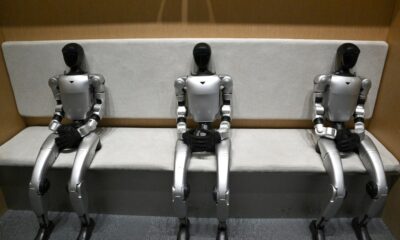Technology
Anthropic Launches Claude Opus 4.5: Cutting Costs and Boosting AI

Anthropic has unveiled its latest artificial intelligence model, Claude Opus 4.5, which boasts significant advancements in performance while reducing costs by approximately two-thirds. Released on March 15, 2025, this model aims to enhance the capabilities of developers and enterprises in an increasingly competitive AI landscape, particularly against established players like OpenAI and Google.
According to internal assessments reviewed by VentureBeat, Claude Opus 4.5 achieved outstanding results, surpassing all human candidates in the company’s rigorous engineering exam. This marks a noteworthy achievement for Anthropic, which is backed by Amazon. The model scored an impressive 80.9% on the SWE-bench Verified benchmark, outperforming OpenAI’s Sonnet 4.5 at 77.2% and Google’s Gemini 3 Pro at 76.2%. This advancement raises questions regarding the future of white-collar jobs, as AI systems demonstrate increasing proficiency in complex tasks.
Significant Cost Reduction and Enhanced Features
The pricing strategy for Claude Opus 4.5 reflects Anthropic’s commitment to making advanced AI accessible. The new rates are set at $5 per million input tokens and $25 per million output tokens, a notable decrease from the previous model’s pricing of $15 and $75. This change is designed to facilitate broader adoption among developers and enterprises, providing them with cutting-edge capabilities at a lower cost.
In an exclusive interview, Alex Albert, Anthropic’s head of developer relations, emphasized the company’s focus on practical applications for the model. “We want to ensure this really works for people who want to work with these models,” he stated, highlighting efforts to enhance user experience and efficiency.
Furthermore, Claude Opus 4.5 introduces features such as “infinite chats,” which allows for extended conversations without the usual context limitations, and programmatic tool calling that enables the AI to execute code directly. These innovations are expected to streamline workflows significantly.
A New Benchmark in AI Performance
Anthropic’s internal testing has shown that Claude Opus 4.5 not only achieves higher accuracy but also demonstrates enhanced judgment and intuition across a variety of tasks. Albert noted that testers have reported a qualitative leap in the model’s reasoning capabilities, enabling it to perform tasks with a more nuanced understanding of real-world contexts.
For instance, in practical applications, Albert shared that he has begun delegating entire tasks to the model rather than just requesting information. This shift indicates a growing trust in AI’s ability to deliver coherent and contextually relevant outputs.
In addition to its impressive scoring on technical benchmarks, Claude Opus 4.5 has been praised for its efficiency. It reportedly utilizes up to 76% fewer tokens compared to its predecessor while achieving similar or superior results. This efficiency not only improves performance but also reduces operational costs for enterprises using the technology.
Early adopters, such as Replit and Rakuten, have validated these claims, reporting significant improvements in coding tasks and overall productivity. For example, Rakuten’s AI agents were able to autonomously refine their capabilities in fewer iterations than competing models, demonstrating the practical benefits of the technology.
As competition intensifies in the AI sector, with both OpenAI and Google rapidly advancing their own models, Anthropic’s timely launch of Claude Opus 4.5 could reshape market dynamics. The company reported reaching $2 billion in annualized revenue in the first quarter of 2025, a significant increase from $1 billion in the previous period. This growth indicates strong demand for their AI solutions and reflects the broader trend of enterprises integrating advanced AI into their operations.
While profitability remains a challenge for many AI developers due to heavy investments in infrastructure and talent, the advancements showcased by Claude Opus 4.5 may prompt more startups to incorporate such technologies into their offerings. As Albert succinctly put it, the results of the engineering exam signal a notable shift in how AI could influence professional roles in the near future.
-

 Science1 month ago
Science1 month agoNostradamus’ 2026 Predictions: Star Death and Dark Events Loom
-

 Technology2 months ago
Technology2 months agoOpenAI to Implement Age Verification for ChatGPT by December 2025
-

 Technology7 months ago
Technology7 months agoDiscover the Top 10 Calorie Counting Apps of 2025
-

 Health5 months ago
Health5 months agoBella Hadid Shares Health Update After Treatment for Lyme Disease
-

 Health5 months ago
Health5 months agoAnalysts Project Stronger Growth for Apple’s iPhone 17 Lineup
-

 Technology5 months ago
Technology5 months agoElectric Moto Influencer Surronster Arrested in Tijuana
-

 Education5 months ago
Education5 months agoHarvard Secures Court Victory Over Federal Funding Cuts
-

 Health5 months ago
Health5 months agoErin Bates Shares Recovery Update Following Sepsis Complications
-

 Technology7 months ago
Technology7 months agoMeta Initiates $60B AI Data Center Expansion, Starting in Ohio
-

 Technology6 months ago
Technology6 months agoDiscover How to Reverse Image Search Using ChatGPT Effortlessly
-

 Science4 months ago
Science4 months agoStarship V3 Set for 2026 Launch After Successful Final Test of Version 2
-

 Technology7 months ago
Technology7 months agoRecovering a Suspended TikTok Account: A Step-by-Step Guide





















